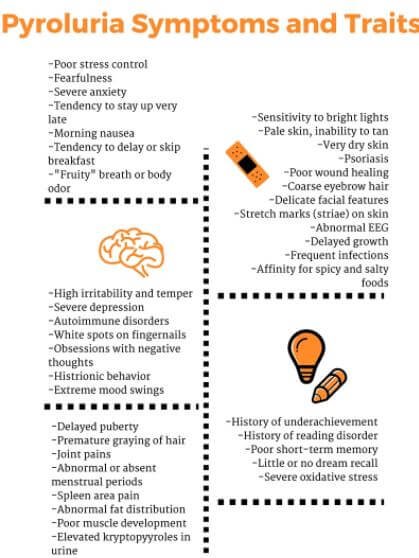What is Pyroluria?
Pyroluria is a condition where the body manufactures excess pyrroles. These chemicals are a byproduct produced when the body makes hemoglobin for red blood cells and they have no purpose in your body. They are usually removed out of the body through urine. People with pyroluria are unable to effectively get rid of pyrroles and as a result they accumulate in their body1, 3.
Causes of Pyroluria
The root cause of pyroluria is the production of excess amounts of “kryptopyrrole” also known as “hemepyrrole” in the blood. When we talk of a pyrrole, it is a chemical substance found in the body which is involved in the process of making heme, the substance that makes blood to be red in color. When pyrroles bind with zinc and vitamin B6, they deplete these nutrients in the body.
Pyroluria happens when pyrroles attach to zinc and Vitamin B6 or pyroxidine. This binding causes large quantities of vitamin B6 and zinc to be flushed out of the body. As a result, it leads to low quantities of these vital nutrients in the body, which can eventually cause Vitamin B6 and Zinc deficiency, respectively.
Vitamin B6 Deficiency
Vitamin B6 helps in the metabolism of amino acids, carbohydrates, lipids, heme and nucleic acid. There are compounds that are closely related to vitamin B6 such as pyridoxamine, pyridoxine and pyridoxal. These compounds are broken down in the body to form pyridoxal phosphate, which acts like a coenzyme in skin metaboliziation and blood reaction5.
Insufficient amounts of vitamin B6 can cause the following:
- Seborrheic dermatitis
- Cheilosis
- Peripheral neuropathy
Zinc Deficiency
Zinc is a vital mineral needed in your body to support manufacture of cells and fight infections. It is required in sexual development and reproduction. When large amounts of zinc are excreted through your urine, it leads to zinc deficiency. Zinc deficiency affects your body to produce healthy cells6.
Zinc deficiency can affect your immune system. Zinc is needed in supporting your body’s immune function and its reduced levels can make you prone to infections. Inadequate zinc levels also delays sexual development as well as make men impotent.
Both zinc and Vitamin B 6 deficiency can cause depression, anxiety, nervousness and poor memory.
Risk Factors for Pyroluria
There are a number of factors that can elevate your risk for pyroluria. They include2:
- People who are under intense stress or depression are more likely to develop pyroluria.
- If you are an alcoholic, you are vulnerable to pyroluria disorder. Alcoholic is a person who suffer from alcoholism; he/she is unable to control consumption of alcohol.
- People suffering from autism are at risk of this disorder. Studies estimate that 50% of people with autism develop pyroluria.
Symptoms of Pyroluria

There are many signs and symptoms associated with pyroluria. They include1, 4:
- People with pyroluria have a weak immune system which elevates their risk to infections. They are too anxious and stressed as well as they are unable to tolerate stressful circumstances. They have a poor memory where they are unable to remember or recall things.
- They also experience pain in their joints and suffer from skin infections such as acne or eczema. They also experience changes in their moods. These symptoms worsen when they are under stress.
Other symptoms of pyroluria include:
- People with pyroluria are allergic to certain substances.
- They experience nausea and motion sickness.
- They do not have appetite particularly in the morning.
Diagnosis of Pyroluria
Pyroluria is diagnosed through kryptopyrroles urine test. Your doctor will tell you to collect your urine and take it to the laboratory for analysis. During the analysis, your doctor will determine the amount of kryptopyrroles in your urine. Your doctor will discuss with you the test results1.
When the test results show numbers above 20ug/dl, it indicates a positive test. This means that you have pyroluria. Number below 20ug/dl indicates negative test and you do not have pyroluria.
Blood test:
If your doctor suspects you have zinc deficiency, blood tests will be ordered. Your doctor will collect a sample of your blood and analyze it for the amount of zinc present.
Other tests
Other tests that can be ordered for zinc include
- Urine test: In this test, you will be instructed to collect your urine and take it to the laboratory for analysis. Your doctor will determine the amount of zinc in the urine to confirm zinc deficiency.
- In addition, your doctor can take a strand of your hair and analyze it to measure the amount of zinc in it.
Treatment for Pyroluria
Treatment for pyroluria aims at restoring the level of zinc and vitamin B 6 in your body. This can be achieved through a healthy diet and supplements as well as dealing with stress2, 3, 5.
Diet
People with pyroluria need food rich in omega 6 fatty acids. You can eat foods such as grass-fed beef, pastured eggs, pastured-fed butter, etc. These foods provide your body with required fats as well they also contain zinc.
Vitamin B 6 foods that people with pyroluria can eat include: green vegetables, meat and seafood. People get vitamin B 6 via the fibers which digestive system microorganisms’ break down to make Vitamin B 6 as a derivative of metabolism5.
You can also eat the following foods that are rich in zinc: wild rice, wheat germ, red meat and poultry.
Supplements
You can treat zinc deficiency by taking multivitamin supplements. Zinc supplements can also be found in certain cold medicines. You should not take cold medicines if you are not ill.6
Before using zinc supplements, consult your doctor. This is because zinc interacts with other drugs such as certain antibiotics, diuretics and medicines that treat arthritis.
Besides zinc, other nutritional supplements that can be used along are:
Vitamin C
It is used to support your adrenal gland due to its antioxidant properties.
Manganese
This mineral is reduced when large amounts of zinc are removed from your body.
Magnesium
This mineral is needed to support absorption of zinc in your body.
Medications
rugs can be prescribed to treat Vitamin B 6 deficiency which is caused by alcoholism or malabsorption. Your doctor can recommend pyridoxine-inactivating drugs such as cycloserine and isoniazid. A dose of 50-100mg of isoniazid taken once daily can restore Vitamin B 6 deficiency and treat pyroluria.5
Management of stress
Prolonged stress worsens the symptoms of pyroluria. Therefore it is vital to manage it so as to treat pyroluria. You can deal with stress by first identifying what is stressing you. Then avoid the stressor. You can also seek the help of a psychiatrist and a counselor to help you manage stress.
Reference List
- https://www.integrativepsychiatry.net/pyroluria.html
- http://drjockers.com/pyroluria-common-unknown-disorder/
- https://www.homeopathyforwomen.org/pyroluria.htm
- http://www.truevitality.com.au/articles/pyrrole-disorder/
- Vitamin B 6 deficiency. http://www.merckmanuals.com/professional/
- Zinc deficiency. https://www.healthline.com/health/zinc-deficiency#treating-zinc-deficiency5
- www.drkaslow.com/html/pyroluria.html
- https://www.diagnose-me.com/symptoms-of/pyroluria.php
- https://www.drlam.com/blog/pyroluria-and-adrenal-fatigue-part-1/10947/
- https://growyouthful.com/ailment/pyroluria.php
- www.naturalhealthprotocol.com/pyroluria.html
